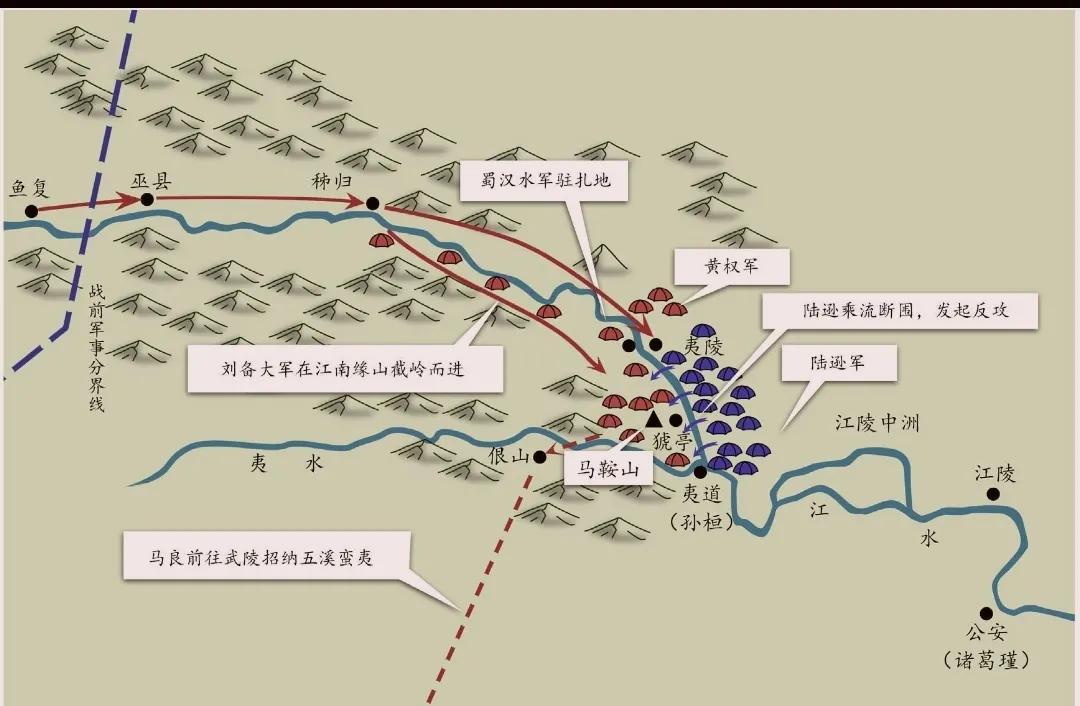
In the twenty-fourth year of Jian'an (219), Liu Bei beheaded Cao Cao's famous general Xiahou Yuan in the Battle of Hanzhong, defeated Cao Cao, and occupied the strategic position of Hanzhong. In the case of such a gradual victory, Liu Beibu sent Guan Yu alone to the North Expedition to Cao Wei, although the flooding of the Seventh Army, captured in the forbidden, beheaded Pound, Wei Zhen Huaxia, and besieged Cao Ren in Xiangyang, reaching a military peak, but the rear of Jingzhou was empty, Eastern Wu reneged on the covenant, and attacked allies, Lü Meng crossed the river in white clothes to take the opportunity to seize Jingzhou (mainly Jiangling and Public Security), and finally Guan Yu was captured by the Wu army and killed, "losing Jingzhou" caused Liu Bei to be seriously injured. After Liu Bei heard about it, he mobilized all the troops of the whole country to fight against Sun Wu, but was defeated by Lu Xun, and Liu Bei retreated to the White Emperor City.
There is no doubt that the White Emperor's city of Tuoguo was a turning point in the politics of the Shu Han Dynasty. Liu Bei died, and Zhuge Liang took the throne, and the connection between them was the White Emperor's city of Tuoguo. In the biography of Zhuge Liang in the Book of the Three Kingdoms and Shu by Zhengshi Chen Shou, it is recorded that in the spring of the third year of Zhang Wu's reign, he first became ill in Yong'an and summoned Liang to Chengdu, which is a later event, which is liang: "The king is ten times more than Cao Pi, and he will be able to secure the country and finally set great things." If the heir can be supplemented, he shall be supplemented; if he is not talented, he may take it upon himself. Liang Sobber said, "The subject dares to exert all his strength to be loyal to the Festival of Chastity, and then die!" The First Lord also said to the Lord after the edict: "Ru and Xiang are engaged in things like fathers." "The Chronicle of the Three Kingdoms and the Book of Shu" li Yan's biography records: Three years, the first lord fell ill, Yan and Zhuge Liang and received the edict to assist the young lord. Most of the later generations of history readers have speculated about Liu Beituo's lonely content from the records of Zhuge Liang's biography. The most painstaking thing is these two sentences "If he is not talented, the king can take his own", the praisers often say that the junchen did not guess so, while the derogatory people said that Liu Bei was calculating Zhuge Liang until his death. We briefly analyze the political situation at that time and The characteristics of Liu Bei's employment.
In history, most of the orphans in history considered that the heirs were young and could not handle political affairs independently before their deaths, so they left the ministers to assist the government. The usual practice was to arrange for trusted vassals to form a solid power structure in order to maintain the position of heir apparent. From this point of view, Liu Bei fully trusted Zhuge Liang. How to understand the "take" in Liu Bei's statement that "if he is not talented, the jun can take it himself", and what is it? I think that Liu Bei is by no means satisfied with the Shu Han Dynasty, so this "Jun can take it upon himself" should refer to "reviving the Han Room", that is, if Liu Chan can complete the great cause of reviving the Han Room, you Zhuge Liang can assist him, if Liu Chan does not have this talent, you Zhuge Liang can raise the banner of reviving the Han Room himself. Liu Bei's intention in saying this to Zhuge Liang was that, no matter what, the cause of reviving the Han Dynasty must be carried out. He used it to publicly express his full trust in Zhuge Liang's talent and loyalty, dispelling any possible doubts about the cause of the Northern Expedition. At the same time, it also avoids the situation of being leaderless after his death.
After Liu Bei finished speaking, "If he is not talented, the king can take himself", Liang Sobbed: "The subject dares to exert all his strength to be loyal to the festival of chastity, and then die!" As a result, he left behind the good story of a loyal subject for thousands of years: "Bow down and do your best, and after death." Then, the First Lord said to the Lord: "Ru and Xiang are engaged in things as the Father." "Leaving aside the political situation, the dialogue between the monarchs and the courtiers recorded in the history books of Shan Cong can be analyzed that Liu Bei knows people well and is a master of winning people's hearts and minds. I think Liu Bei fully trusted Zhuge Liang, whether it was his talent or loyalty, but Liu Beilin's death in his mouth said "Jun can take his own" made Zhuge Liang express his loyalty to Liu Shi in public, and then let Liu Chan zhuge Liang be like a father. It can be said that Zhuge Liang was bound to liu with the Confucian moral concept of "junjun, subject, father, son". This Yang scheme used against gentlemen can be described as pure fire.